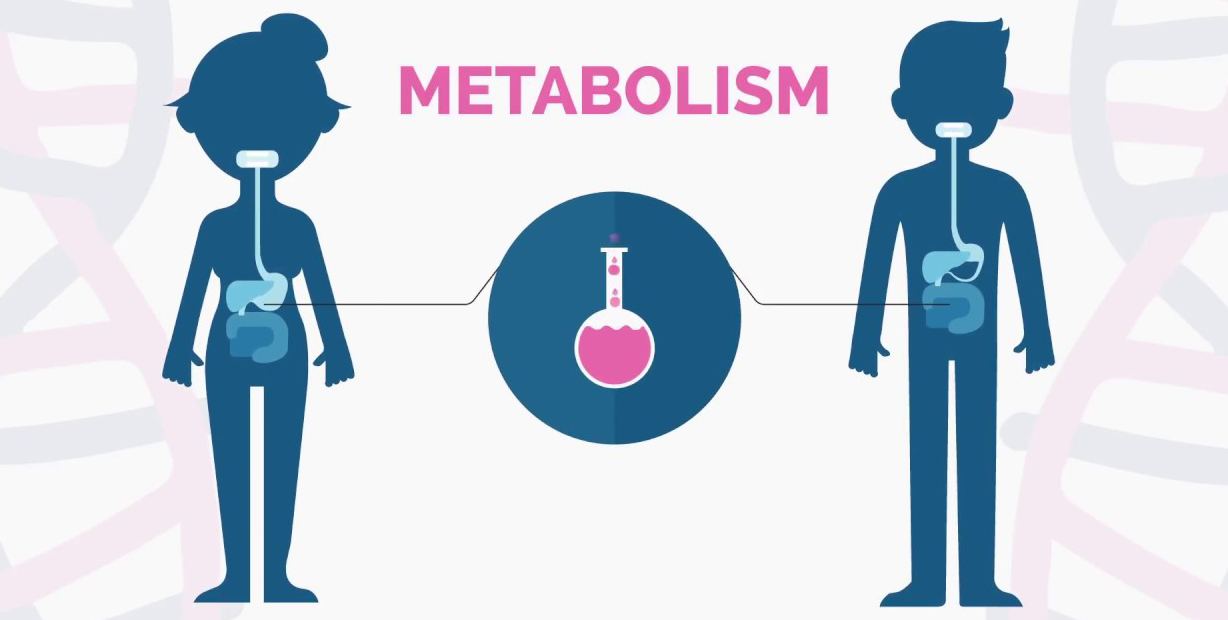How does your metabolism work?
Metabolism is the chemical process your body uses to transform the food you eat into the fuel that keeps you alive.Nutrition (food) consists of proteins, carbohydrates, and fats. These substances are broken down by enzymes in your digestive system, and then carried to the cells where they can be used as fuel. Your body either uses these substances immediately, or stores them in the liver, body fat, and muscle tissues for later use.
What is a metabolic disorder?
A metabolic disorder occurs when the metabolism process fails and causes the body to have either too much or too little of the essential substances needed to stay healthy.
Our bodies are very sensitive to errors in metabolism. The body must have amino acids and many types of proteins to perform all of its functions. For example, the brain needs calcium, potassium, and sodium to generate electrical impulses, and lipids (fats and oils) to maintain a healthy nervous system.
Metabolic disorders can take many forms. This includes:
- a missing enzyme or vitamin that’s necessary for an important chemical reaction
- abnormal chemical reactions that hinder metabolic processes
- a disease in the liver, pancreas, endocrine glands, or other organs involved in metabolism
- nutritional deficiencies
You can develop a metabolic disorder if certain organs — for instance, the pancreas or the liver — stop functioning properly. These kinds of disorders can be a result of genetics, a deficiency in a certain hormone or enzyme, consuming too much of certain foods, or a number of other factors.
There are hundreds of genetic metabolic disorders caused by mutations of single genes. These mutations can be passed down through generations of families. According to the National Institutes of Health (NIH), certain racial or ethnic groups are more likely to pass on mutated genes for particular inborn disorders. The most common of these are:
- sickle cell anemia in African Americans
- cystic fibrosis in people of European heritage
- maple syrup urine disease in Mennonite communities
- Gaucher’s disease in Jewish people from Eastern Europe
- hemochromatosis in Caucasians in the United States
Types of metabolic disorders
Diabetes is the most common metabolic disease. There are two types of diabetes:
- Type 1, the cause of which is unknown, although there can be a genetic factor.
- Type 2, which can be acquired, or potentially caused by genetic factors as well.
According to the American Diabetes Association, 30.3 million children and adults, or about 9.4 percent of the U.S. population have diabetes.
In type 1 diabetes, the T cells attack and kill beta cells in the pancreas, the cells that produce insulin. Over time, a lack of insulin can cause:
- nerve and kidney damage
- eyesight impairment
- increased risk of heart and vascular disease
Hundreds of inborn errors in metabolism (IEM) have been identified, and most are extremely rare. However, it’s estimated that IEM collectively affects 1 in every 1,000 infants. Many of these disorders can only be treated by limiting dietary intake of the substance or substances the body cannot process.
The more common types of nutritional and metabolic disorders include:
Gaucher’s diseaseThis condition causes an inability to break down a particular kind of fat, which accumulates in the liver, spleen, and bone marrow. This inability can result in pain, bone damage, and even death. It’s treated with enzyme replacement therapy.
Glucose galactose malabsorptionThis is a defect in the transport of glucose and galactose across the stomach lining which leads to severe diarrhea and dehydration. Symptoms are controlled by removing lactose, sucrose, and glucose from the diet.
Hereditary hemochromatosisIn this condition, excess iron is deposited in several organs, and can cause:
- liver cirrhosis
- liver cancer
- diabetes
- heart disease
It’s treated by removing blood from the body (phlebotomy) on a regular basis.
Maple syrup urine disease (MSUD)MSUD disrupts the metabolism of certain amino acids, causing rapid degeneration of the neurons. If not treated, it causes death within the first few months after birth. Treatment involves limiting the dietary intake of branched-chain amino acids.
Phenylketonuria (PKU)PKU causes an inability to produce the enzyme, phenylalanine hydroxylase, resulting in organ damage, mental retardation, and unusual posture. It’s treated by limiting the dietary intake of certain forms of protein.
Outlook
Metabolic disorders are highly complex and rare. Even so, they’re the subject of ongoing research, which is also helping scientists to better understand the underlying causes of more common problems such as lactose, sucrose, and glucose intolerance, and the overabundance of certain proteins.
If you have a metabolic disorder, you can work with your doctor to find a treatment plan that’s right for you.
-f96812597dd99657cf790d781aed10484e02389417efb7f541bb8c59f60fed17.png)
